|
|
|
Sort Order |
|
|
|
Items / Page
|
|
|
|
|
|
|
| Srl | Item |
| 1 |
ID:
059459


|
|
|
|
|
| Publication |
Spring-Summer 2004.
|
|
|
|
|
|
|
|
|
|
|
|
|
|
|
|
| 2 |
ID:
173404


|
|
|
| 3 |
ID:
140405
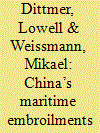

|
|
|
|
|
| Summary/Abstract |
CHINA’S MARITIME PERIPHERY OR ‘‘NEAR SEAS—the Yellow Sea, the East China Sea, and the South China Sea—are waters through which a great deal of vital commerce flows, as China, Japan, Korea, and numerous Southeast Asian countries are all major trading nations that import the energy and raw materials that sustain their thriving economies. Since 2009 the East and South China Seas have become increasingly fraught with tension. This has generally been attributed to rising Chinese assertiveness, but not because China has started making a lot of assertions it never made before. As the authors assembled here point out in replete detail, China’s explicit claims to the Diaoyu/Senkaku islets in the East China Sea date back at least to 1971, while it can trace its claim in the South China Sea back to the publication of the famous ‘‘nine-dashed line’’ map by the Nationalists in 1947 (at the time it contained eleven segmented lines; the victorious Communists subsequently dropped two).
|
|
|
|
|
|
|
|
|
|
|
|
|
|
|
|
| 4 |
ID:
165727
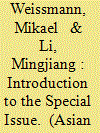

|
|
|
| 5 |
ID:
165357
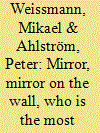

|
|
|
|
|
| Summary/Abstract |
This article explores why the offensive predominates military tactical thinking. With survey results showing an offensive bias among 60 per cent of senior Swedish officers and as many as 80 per cent in the case of the army, it is clear that this is not just a problem of the past but is equally relevant today. The article asks why there is a tendency to perceive and understand offensive tactics as the preferred choice and the way to conduct battle that should be encouraged and preferred. Drawing on existing research and the findings of a pilot study, ten propositions for why the offensive bias exists are tested using a mixed-method approach. Based on the findings, the article develops a model to understand why the offensive dominates military tactical thinking. It is found that the two key constitutive factors behind the offensive bias are military culture and education. These factors most directly and profoundly influence an officer’s identity, perceptions, and thinking. Military culture and education, in turn, work as a prism for four other factors: military history, the theory and principles of war, doctrine and TTPs, and psychological factors.
|
|
|
|
|
|
|
|
|
|
|
|
|
|
|
|
| 6 |
ID:
149316
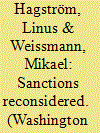

|
|
|
|
|
| Summary/Abstract |
Since at least the early 1990s,11. This research was funded by grants from the Swedish Ministry of Foreign Affairs within the Special Research Program of the Swedish Institute of International Affairs and the Marianne and Marcus Wallenberg Foundation (MMW 2013.0162). The opinions expressed are those of the authors alone.
View all notes
there have been regular predictions of North Korea's imminent collapse—so much so that a degree of wishful thinking or “collapsism” has even characterized the debate.22. Jong-kun Choi, “The Perils of Strategic Patience with North Korea,” The Washington Quarterly 38, no. 4 (Winter 2016), pp. 57–72, http://www.tandfonline.com/doi/abs/10.1080/0163660X.2015.1125829.
View all notes
Yet, the state has managed to survive, despite its corrupt deity-cult leadership, devastating famines, a largely failed economy, and an increasingly stringent international sanctions regime. In fact, North Korea's regime has not only survived, but also succeeded in resisting international pressures aimed at rolling back its nuclear program.
|
|
|
|
|
|
|
|
|
|
|
|
|
|
|
|
| 7 |
ID:
140412


|
|
|
|
|
| Summary/Abstract |
Using a conflict transformation framework, this article demonstrates that positive transformations have taken place in the South China Sea between 1991 and 2007. Even though these transformations have been weakened in recent years, particularly regarding the actor aspect, it is concluded that a major armed conflict is still highly unlikely.
|
|
|
|
|
|
|
|
|
|
|
|
|
|
|
|
| 8 |
ID:
165728
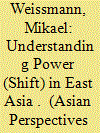

|
|
|
|
|
| Summary/Abstract |
In this article I study the competing US and Chinese narratives about the South China Sea. Arguing that the practice of calculating power shifts in terms of the changing distribution of material capabilities is inadequate, I complement existing literature by taking ideational and normative dimensions of power into account. I ask what the alternative Chinese narrative of power and leadership in the South China Sea looks like and how it is perceived by others in comparison with the dominant US narrative. While a "hard" power transition is ongoing, China's preferred narrative has yet to become widely accepted and the US narrative will remain dominant for now. Nevertheless, China has been making progress in shifting the narrative of what the future could look like with China's vision for a post-US regional and global order now seen as a possible alternative.
|
|
|
|
|
|
|
|
|
|
|
|
|
|
|
|
| 9 |
ID:
158710


|
|
|
|
|
| Summary/Abstract |
Under President Xi Jinping's leadership, Chinese foreign relations have moved from keeping a low profile, to a more assertive bid for international leadership that is beginning to take form in the ‘belt and road initiative’ (BRI). This initiative focuses on connectivity in policy coordination, facilities, trade, finance and people-to-people relations, in order to connect China to key parts of Asia, the south Pacific, east Africa and Europe. Networked capitalism and the national unit, which are often seen as spatial opposites in the global political economy, are both exercised through the BRI in mutually supporting ways. Networked capitalism is not challenging the national spatial unit, nor vice versa. Rather, they conglomerate to reinforce Chinese government narratives which portray China as the new trailblazer of global capitalism—thus illustrating and justifying a new Sinocentric order in east Asia. Likely winners of this constellation, if it is successful, are megalopolises in Eurasia, and most of all the Chinese Communist Party. Likely losers are countries that are not included in the BRI, most notably the United States. In a context where President Donald Trump is signalling a more protectionist stance and the United States is withdrawing from free trade pacts like the Trans-Pacific Partnership, Trump may ironically enable Xi's dream of making China great again.
|
|
|
|
|
|
|
|
|
|
|
|
|
|
|
|
|
|
|
|
|